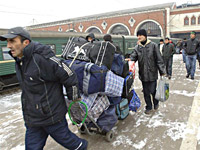The National Statistics Service (NSS) has published the report for 2011. The economic activity (growth) rate was 5.9%. The sectors of production and agriculture have grown by 14.1%. Other sectors have grown as well (besides the sector of construction), the export growth is more than the import growth.
In a word, these statistical data are not the best but are not bad either. Certainly the minister of economy Tigran Davtyan would be happy for such information and claim that his predictions had come true. Of course it would inspire him to speak about the future as well, specifically concerning the sector of production. In such situation journalists would ask him if the situation with the economy is so good why people emigrate and why migration is becoming more intensive. “Migration is not included in this sector,” said Tigran Davtyan. Davtyan is a professional man but he thinks that migration is not connected with the economy. Simply he decided not to discuss and touch upon this issue because there are other institutions in charge of migration such as the ministry of migration and the Diaspora ministry with its “Come home” project. However, we believe that migration is closely connected with the economy and it impacts on both the counties that export labor and those that import.
Below we will discuss what is the influence of labor migration in countries that export such as Armenia. There are different opinions. In 80s there were a number of researches showing that the influence above is positive. According o such researches, export of migration resulted in improvement of the labor market in the home country. For example, in Pakistan in the 80s emigration allowed to cut down the unemployment rate by one thirds. The same happened in Bangladesh as well. According to certain sources of statistics, migration of labor may result in growth of salaries and incomes of the poor in the exporting country.
Many experts believe that emigration of labor also results in the improvement of professionalism of labor the country has exported. This means that in other countries emigrants work with more professional people and learn better and improved technical skills and standards connected with effective organization of production. When they return to their home countries they share their experience with others.
Another factor is the increased financial inflows a country exporting migration may have. These people send a part of the money they make abroad to their families and friends, thus improving the financial standing of the country. Concerning the opinion on “outflow of brains the authors of researches say that in case of a wave of migration the first group of people to leave are those with better professionalism and qualities. In addition, they assure that the outflow of brains is not dangerous for a country because if there is more supply of intellectual labor, it is better to export a part of that supply to balance the supply and demand, thus it is normal if those who don’t find jobs in their countries find what they want in other countries.
In a word, the government can claim that emigration is not dangerous but in some cases it may be even helpful for the country’s economy. However, always there are contradicting opinions and many people may criticize and oppose to the points above. First of all the professional and experienced people are migrating. In addition, these people migrate not only due to social and economic issues, but political and law problems as well.
However, those emigrants who are settled in other countries and have good jobs not only refuse to return to Armenia but call their relatives and friends to those countries too. In case of the financial inflow and money transfers to Armenia it is difficult to say whether it is good for the economy or no. We have that experience when during many years the money transfers from other countries slumped the domestic production to zero. Of course in case of a smart policy we could escape from such situation but it is in the past already. It is also worth mentioning that these foreign transfers to Armenia have changed the functions and picture of the economy and the country is dependent from foreign transfers now.
We should not be happy for poverty reduction because partly it is done as a result of migration as the government sends the poor and critical masses out of the country. For other countries immigration is not a bad thing and they don’t suffer if these groups of people send money out of their countries. For example, smart and professional young people mostly emigrate to the US and they bring huge contribution t the development of their economy. In 80s 40% of the professionals in IT sector and engineers were immigrants. In 1990s there were 11 million immigrants in the US. The US government was helping them by providing 4-5 billion dollars for them every year, but instead of that those immigrants were paying 40 billion dollars taxes every year. All the information above shows that migration and issues connected with migration are strongly connected with the economy and cannot be discussed out of that context. No one can prove that migration issues and capacities are not taken into account in developing economic policies and do not change the situation of the economy. On the other hand, it is a different issue if this problem is a pain for them and they are trying to stay far away from it in consideration of the past experience.

